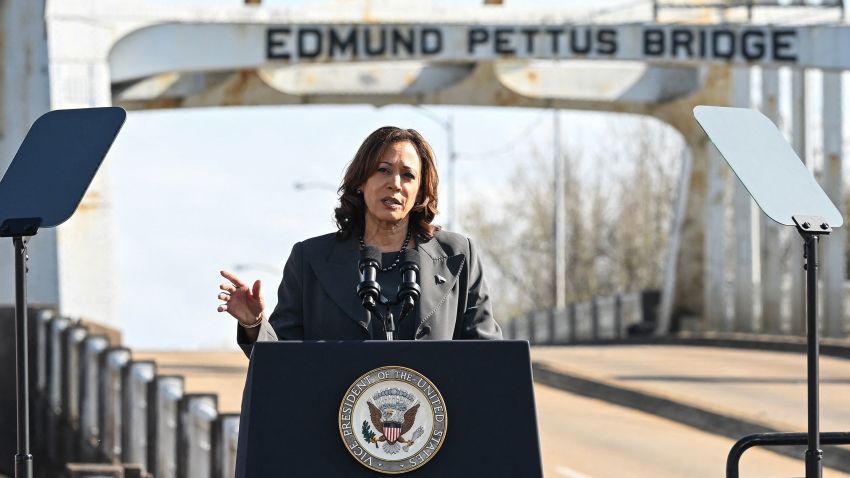
In Short
- Kamala harris’s recent visit to selma marks her fifth participation in the yearly civil rights march.
- Her advocacy for increased humanitarian aid in gaza reflects a strong stance on global humanitarian issues.
- Harris’s actions underscore the ongoing relevance of civil rights activism and the pressing need for humanitarian assistance in conflict zones like gaza.
TFD – Dive into the profound impact of Kamala Harris as she participates in the civil rights march in Selma for the fifth time, while also advocating for increased humanitarian aid in Gaza. Discover how her actions continue to shape conversations and drive change.
In one of the most strident appeals by a US official to date, Vice President Kamala Harris pushed for increased humanitarian aid into Gaza on Sunday, stating that residents in the area are “starving” despite “inhumane” circumstances.
Harris has been actively involved in the post-conflict planning for the beleaguered coastal enclave and has been closely watching the humanitarian catastrophe in Gaza. Harris was in Selma, Alabama, to celebrate the 59th anniversary of Bloody Sunday.
Her comments on Sunday signaled a stronger US drive to deal with the Gaza crisis. In order to greatly boost the flow of aid, the Israeli government needs to take further action. Not one excuse, Harris declared.
Additionally, her remarks are made at a turning point in the Israel-Hamas conflict. The US continues to push for a temporary ceasefire and captive release, and on Monday the vice president is scheduled to meet with Benny Gantz, a challenger of Israeli Prime Minister Benjamin Netanyahu and an important member of the Israeli War Cabinet.
“What we witness in Gaza on a daily basis is heartbreaking. Families have reportedly been observed consuming animal feed or leaves. Harris cited the deaths of scores of Palestinians amid Israeli gunfire and fear at Gaza food lines. “Women giving birth to malnourished babies with little or no medical care, and children dying from malnutrition and dehydration,” Harris added.
“Our hearts bleed for the innocent people of Gaza who are suffering from what is obviously a humanitarian crisis as well as for the victims of that terrible tragedy. Gaza’s population is famished. The living circumstances are barbaric,” she said.
Additionally, Harris repeated President Joe Biden’s requests for a six-week truce, which would permit the release of hostages held by Hamas and a large influx of humanitarian aid into Gaza.
To applause from the audience, Harris stated, “Given the immense scale of suffering in Gaza, there must be an immediate ceasefire, for at least the next six weeks, which is what is currently on the table.”
“Hamas says it’s in favor of a cease-fire. A deal is, in fact, on the table. Furthermore, Hamas must accept that agreement, as we have stated. Let’s agree to a stopfire. Let’s reunite the hostages with their families. And let’s provide immediate relief to the people of Gaza,” she added.
After Biden declared that the US would make “every stop” to get more aid into the region, the US and Jordan airdropped humanitarian supplies into Gaza on Saturday.
While praising the initiative as effective, senior administration officials insisted that more work needed to be done to address the Gaza problem, including making sure land borders are open so that additional aid can be sent into the area. In order to send help, officials are also looking at a marine route.
An yearly celebration
Speaking at the site of a pivotal moment in the civil rights movement, Harris also issued a warning on Sunday, 59 years after Bloody Sunday, citing “extremist” Republican efforts to impose restrictions on voting rights, reproductive rights, and other issues, putting Americans’ freedoms in jeopardy once more.
“The difficulties we confront today are not dissimilar from those encountered by those courageous individuals fifty-nine years ago,” she remarked prior to crossing the Edmund Pettus Bridge, the scene of bloodshed in 1965 when 600 individuals started a march from Selma to Montgomery, calling for an end to discrimination in voter registration.
The demonstrators were forced to return to Selma in 1965 after state and municipal law enforcement in Alabama attacked them with billy clubs and tear gas on the bridge. Police injured scores of people and sent seventeen people to the hospital. A few months following the violence, the Voting Rights Act became a law.
We are also faced with a basic question at this moment: What type of nation do we want to live in? Which would we prefer—a nation of injustice, hatred, and terror, or one of freedom, liberty, and justice? With our voices, our votes, and our feet, each of us has the ability to respond to that question,” Harris stated on Sunday.
In addition, the vice president declared that “the fight for freedom is not over,” citing initiatives to restrict women’s rights, voting rights, and the freedom from gun violence.
Harris’s trip to Selma was her fifth time taking part in the yearly civil rights march. In addition to attending as a vice president in 2022, she ran for president in 2020 and was a senator in 2018. In 2021, she participated virtually as well.
Conclusion
Kamala Harris’s commitment to civil rights and humanitarian causes shines through her actions in Selma and advocacy for Gaza. As she continues to champion justice and equality, her impact resonates globally. Let us heed her call for action and strive for a world where all people are treated with dignity and compassion.
Connect with us for the Latest, Current, and Breaking News news updates and videos from thefoxdaily.com. The most recent news in the United States, around the world , in business, opinion, technology, politics, and sports, follow Thefoxdaily on X, Facebook, and Instagram .
